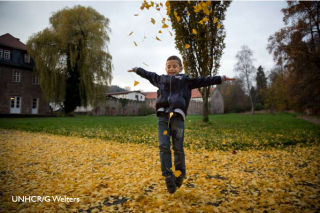MPI Europe Research for the EU Action on Facilitating Resettlement and Refugee Admission through New Knowledge (EU-FRANK) Project

The EU-FRANK project, which stands for European Union Action on Facilitating Resettlement and Refugee Admission through New Knowledge, aims at strengthening the capacity of national governments to provide international protection to refugees through resettlement. It builds on the assumption that there is much to learn by exchanging experiences and working together with colleagues from other states, learning from and adapting best practices that exist elsewhere. For all the partner organizations involved in this project and the research, events, and other resources they generated, visit www.eu-frank.eu/.
The reports published by MPI Europe as part of the EU-FRANK project are collected here:
The Next Generation of Refugee Resettlement in Europe: Ambitions for the Future and How to Realize Them
In recent years, the European Union and some of its Member States have taken on a greater role in global refugee resettlement, expanding or launching new programs and experimenting with creative approaches to providing protection to those in need. This report looks ahead to how these efforts, investments, and lessons learned can be built upon, even in the face of the uncertainty brought by the COVID-19 pandemic.
Building Welcome from the Ground up: European Small and Rural Communities Engaging in Refugee Resettlement
Small towns and rural areas within Europe have become more active in receiving resettled refugees in recent years. How is resettlement to these communities different compared to urban areas? And what can be done to make good on the promise of “rural welcoming”? This report explores these questions, drawing on interviews with resettled refugees and receiving-community members in Belgium, Italy, the Netherlands, and Sweden.
Using Evidence to Improve Refugee Resettlement: A Monitoring and Evaluation Road Map
There has been a flurry of activity around refugee resettlement in recent years, with countries in Europe and elsewhere piloting or scaling up operations. To support the sustainability of these programs, particularly in light of the hiatus forced by the COVID-19 pandemic, strong evidence of what works and under what conditions is essential. This report explores how countries can launch or expand their monitoring and evaluation (M&E) activities, and the value this can bring.
Preparing for the Unknown: Designing Effective Predeparture Orientation for Resettling Refugees
Refugees encounter a range of challenges after resettlement—from adjusting to a new culture and language, to finding a job. Many resettlement countries invest in predeparture orientation to help refugees develop the knowledge, skills, and attitudes to face these challenges. This report explores the many forms these programs take, highlighting important design questions and key elements that effective programs share.
Scaling up Refugee Resettlement in Europe: The Role of Institutional Peer Support
With pressure mounting on EU Member States to create and scale up refugee resettlement programs, many have turned to peers in other countries for information, advice, and operational support. This report maps the many forms resettlement-focused peer-support initiatives take and discusses common stumbling blocks and strategies for policymakers and program designers looking to make the most of these critical exchanges.
Taking Stock of Refugee Resettlement: Policy Objectives, Practical Tradeoffs, and the Evidence Base
With displacement at a record high, governments around the world are looking for ways to jumpstart, expand, or maximize the impact of their refugee resettlement programs. Yet the evidence base regarding the effectiveness of such programs is particularly thin. This report maps the gaps in knowledge that exist and identifies areas where further research could help inform policymakers' actions.

